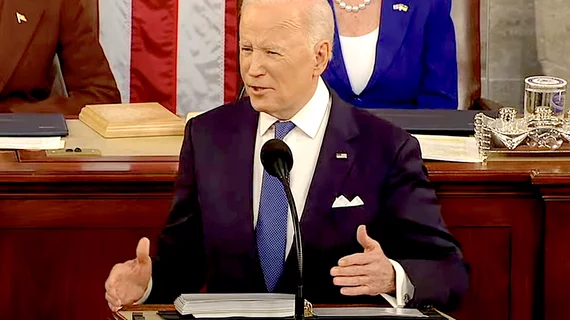Biden signs executive order on reproductive healthcare
Two weeks after the Supreme Court sent the right to abortion care access back to the states by overturning Roe v. Wade, President Joe Biden issued an executive order that aims to protect patients seeking reproductive healthcare.
While the president does not have the authority to overturn a Supreme Court decision, the move could improve pathways to access for reproductive care. It’s also somewhat unclear what the vague order will accomplish. According to the White House, the order aims to:
- Safeguard access to reproductive health care services, including abortion and contraception;
- Protect the privacy of patients and their access to accurate information;
- Promote the safety and security of patients, providers, and clinics; and
- Coordinate the implementation of Federal efforts to protect reproductive rights and access to healthcare.
The Supreme Court’s June decision to allow states to decide for themselves about access to abortion care was met with immediate backlash from the medical community. The quickest and firmest way to ensure the right to abortion care in the U.S. is through a federal law passed by Congress, which Biden said he would sign into law.
['Unconscionable': Healthcare's reaction to the Roe v. Wade decision]
During a press conference July 8, Biden chided the court for its radical decision, and warned that a national ban on abortion care could be next. He also noted a recent media story in which a 10-year-old girl was denied an abortion in Ohio after she became pregnant from being raped.
“What century are they in?” Biden asked of the Supreme Court.
Executive Order Actions
Beyond concerns about access to abortion care, Biden’s order also addresses glaring privacy issues with the court’s decision. The order instructus the Department of Health and Human Services (HHS) and the Federal Trade Commission (FTC) to protect patient data when seeking reproductive care. The administration will also consider other moves under the Health Insurance Portability and Accountability Act (HIPAA) to protect patient privacy and sensitive health information related to private health information.
During his speech, Biden noted that search engines and health apps that store personal health information and queries should not be allowed to sell that information.
“There is growing concern that far right governments will seek your data,” Biden said. “Talk about no privacy. Period. This executive order asks the FTC to crack down on data brokers that sell private information to extreme groups.”
HHS also addressed this issue, publishing a guidance on what the Supreme Court ruling could mean for health information and the rules of sharing private health information with law enforcement under HIPAA.
Biden’s order also establishes an interagency task force, including the Attorney General, that will focus on reproductive healthcare access and coordinate Federal interagency policymaking and program development. The Attorney General will also provide technical assistance to states affording legal protection to out-of-state patients as well as providers who offer legal reproductive health care, according to the order.
HHS announced $3 million more in funding to all HHS-funded providers and clinics to bolster training and technical assistance for the nationwide network of Title X family planning providers. The agency also launched a resources website, ReproductiveRights.gov, to provide timely and accurate health information about reproductive rights and access to reproductive healthcare.
Another area of concern is what the Supreme Court will do next. As noted by Justice Alito in the majority opinion, it is likely the court will reconsider access to contraceptive care in an upcoming term. Biden directed HHS to expand access to the full range of reproductive health services, including family planning services and providers, such as access to emergency contraception and long-acting reversible contraception like intrauterine devices (IUDs). Contraceptive coverage at no cost-sharing to patients was a hallmark piece of the Affordable Care Act, which was signed into law while Biden was vice president to President Barack Obama. HHS is also directed to expand access to medication abortion.

